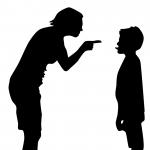What Parents Should Do

Parents can have a role in soothing and helping kids overcome their fears. “Anxiety—fears—such as monsters under the bed are a normal part of childhood. Some children are naturally more sensitive to such fears than other children. Yet, when a youngster is afraid of something, it’s important to take it seriously,” said Dr. Carla Marie Manly, a clinical psychologist and author of My Fear, My Friend!
Here are some suggestions on what parents should do when a child is afraid.
Believe them. While you might not see why a child’s afraid, you can tell that it’s real to the child. “For example, if he is afraid of noises in the dark, he can get a flashlight (and a friend or parent) to investigate the noises to see what they are. As he finds out—in a supported way—that some (or all) of his fears are imagined, he will gain courage. He will learn to differentiate between what he is imagining to be harmful and what is actually harmful (the actually harmful issues will, in truth, will be few and far between),” Manly said.
Be calm and supportive. Validate their concerns and express empathy. “Recognize and acknowledge the fear by asking the child if there is something you can do to help them work through their fears,” Chambers said. “This doesn’t mean agreeing that monsters could be a problem,” Bilek cautioned. “It just means acknowledging that they are afraid and respecting their right to their emotions.”
Watch media exposure. There’s a lot going in a child’s mind, and we have to be sensitive in what we expose our children to online, in movies, in video games, etc. “As someone who suffered from irrational fears when I was a child, I know that this fear can be paralyzing for kids,” said Iftikhar Khan of San Jose, California. “My daughter has the same challenge as me, so we’re very careful about what media we expose her to.”
Consider self-soothing options. Some kids have a security blanket or a favorite stuffed animal. These are all ways kids self-soothe in stressful or fearful situations. If your child has such an object, then encourage them to continue sleeping with that—even if you think he or she has “grown up” too much.
Also teach kids techniques on how to calm down. Barlis recommended showing kids how to breath. “Most anxiety is caused by not breathing out,” noted Barlis. In addition, simple visualization or meditation techniques, like quoting Scripture or other mantras, can help kids let go of their fear.
Give kids control over their fear. When a child is afraid, the child doesn’t feel in control. Giving the child power over her fear helps her conquer that fear through action. “A ‘monster under the bed’ fear can be tamed in the preschool and the early elementary years by putting the child in a position of power,” said Eadie. She suggested that parents help their child put up signs in the bedroom that say “Go away, monsters” or give them squirt bottles of “monster juice” to blast away a monster.
Another way to give kids power over their fear is through play. “Play is an important way for children to learn to handle their emotional reactions to terrorism—feeling scared, sad, mad and bad. For example, after 9/11, many children reenacted planes flying into buildings they’d made of LEGOs, then they rebuilt the buildings,” Lieberman said. “This was comforting to them.”
Most kids outgrow their childhood fears, but can benefit from learning how to overcome being afraid. “These fears will subside over time; offering empathy and understanding is the best thing you can do in the meantime,” said Bilek.
To connect with Sarah and read more about raising kids, visit www.parentcoachnova.com.












